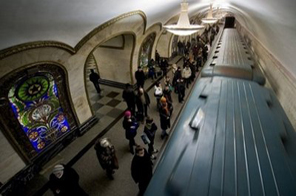Dozens dead in twin blasts on Moscow metro
MOSCOW: Two suicide bombers blew themselves up Monday on trains on Moscow's metro system, killing at least 34 people during morning rush-hour, emergency workers and prosecutors said.
The first explosion took place on a train after it had stopped in the Lubyanka station in central Moscow, close to the headquarters of Russia's FSB security service, a spokeswoman for the Russian emergencies ministry told AFP.
Minutes later, a second explosion went off in a carriage as the train was on the platform at the Park Kulturi metro station, also in central Moscow.
Moscow's chief prosecutor said that the attacks, the deadliest in the capital for several years, were caused by suicide bombers wearing belts packed with explosives.
The first blast at the Lubyanka metro station killed 22 people and wounded 12. The second at Park Kulturi station left 12 dead and 7 wounded.
Rescue workers rushed to the scene but the ITAR-TASS news agency said that emergency services were impeded from accessing the site of the blast due to the early morning rush hour traffic.
At Lubyanka Square, next to the metro station of the same name, dozens of orange and red trucks from the emergency services and fire department were present, an AFP correspondent reported.
An emergency services helicopter landed on Lubyanka Square, home to the FSB security service, the successor to the notorious Soviet KGB secret police.
While the affected stations and lines were shut, some metro lines were still open and police were checking people's suitcases and large bags.
Around the Lubyanka metro station, crowds of people were calling loved ones but phone lines were busy as the network became overloaded, an AFP correspondent said.
The Russian capital has been hit over the last decade by a string of deadly explosions claimed by militants from its turbulent southern region of Chechnya but such events had become less frequent in the last years.
The authorities were quick to blame the blasts on militants.
"An inquiry has been opened according to article 205 of the Russian criminal code -- terrorism," Russian news agencies quoted the spokesman of the investigative committee of prosecutors, Vladimir Markin, as saying.
The head of the Federal Security Service (FSB) Alexander Borotnikov was putting together a report for President Dmitry Medvedev. Meanwhile, the authorities denied rumours of a third blast at another metro station.
The Interfax news agency quoted a security source as saying that the first explosion could have been triggered by a suicide bomber.
"There is information that the explosion was caused by a suicide bomber," the source said.
However another source later told Interfax that the explosive material could have been detonated by mobile phone.
"Experts will start working once all the wounded have been helped and everyone has been evacuated," said the source.
Chechnya itself has seen a worrying rise in violence over the last months as the pro-Kremlin local authorities seek to clamp down on an Islamist uprising.
Citing better security, Russia last year abolished an "anti-terror" operation in Chechnya that has been in place for the last decade but its confidence has been belied by the spike in violence.
Increased violence in the nearby majority-Muslim regions of Ingushetia and Dagestan had also raised fears on the part of the authorities that the unrest could spread to Moscow.






